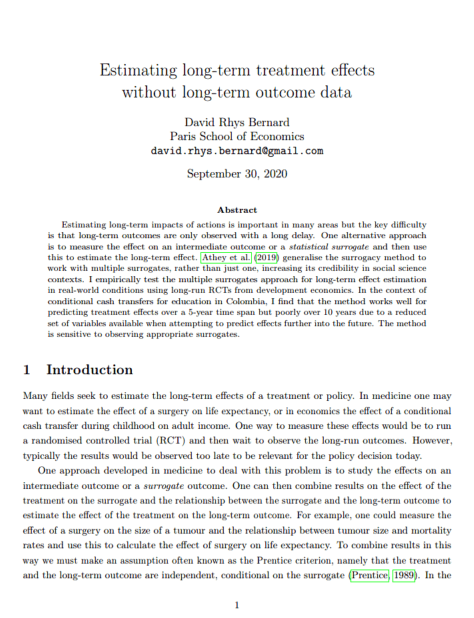Estimating long-term treatment effects without long-term outcome data
David Rhys Bernard (Paris School of Economics)
GPI Working Paper No. 11-2020
This paper has been awarded the paper prize of the 2019 Early Career Conference Programme.
Estimating long-term impacts of actions is important in many areas but the key difficulty is that long-term outcomes are only observed with a long delay. One alternative approach is to measure the effect on an intermediate outcome or a statistical surrogate and then use this to estimate the long-term effect. Athey et al. (2019) generalise the surrogacy method to work with multiple surrogates, rather than just one, increasing its credibility in social science contexts. I empirically test the multiple surrogates approach for long-term effect estimation in real-world conditions using long-run RCTs from development economics. In the context of conditional cash transfers for education in Colombia, I find that the method works well for predicting treatment effects over a 5-year time span but poorly over 10 years due to a reduced set of variables available when attempting to predict effects further into the future. The method is sensitive to observing appropriate surrogates.
Other working papers
Critical-set views, biographical identity, and the long term – Elliott Thornley (Global Priorities Institute, University of Oxford)
Critical-set views avoid the Repugnant Conclusion by subtracting some constant from the welfare score of each life in a population. These views are thus sensitive to facts about biographical identity: identity between lives. In this paper, I argue that questions of biographical identity give us reason to reject critical-set views and embrace the total view. I end with a practical implication. If we shift our credences towards the total view, we should also shift our efforts towards ensuring that humanity survives for the long term.
‘The only ethical argument for positive 𝛿’? – Andreas Mogensen (Global Priorities Institute, Oxford University)
I consider whether a positive rate of pure intergenerational time preference is justifiable in terms of agent-relative moral reasons relating to partiality between generations, an idea I call discounting for kinship. I respond to Parfit’s objections to discounting for kinship, but then highlight a number of apparent limitations of this…
It Only Takes One: The Psychology of Unilateral Decisions – Joshua Lewis (New York University) et al.
Sometimes, one decision can guarantee that a risky event will happen. For instance, it only took one team of researchers to synthesize and publish the horsepox genome, thus imposing its publication even though other researchers might have refrained for biosecurity reasons. We examine cases where everybody who can impose a given event has the same goal but different information about whether the event furthers that goal. …

